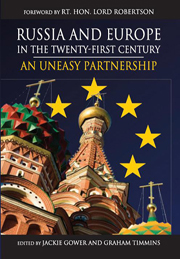Book contents
- Frontmatter
- Contents
- List of Contributors
- Acknowledgements
- List of Abbreviations/Acronyms
- Foreword Russia and Europe
- Preface
- Introduction Russia and Europe: What Kind of Partnership?
- PART 1 Russia looking West
- Chapter 1 Vladimir Putin and Russian Foreign Policy towards the West: Towards a New Realism
- Chapter 2 The ‘Normalization’ of Russian Politics and Europe
- Chapter 3 The Russian Elite Perspective on European Relations
- Chapter 4 Domestic Politics and Foreign Policy Formulation
- Chapter 5 Russia's Regions in Shaping National Foreign Policy
- Chapter 6 The Russian Military and European Security Cooperation
- PART 2 Europe looking East
- PART 3 Partnership in Practice
- Conclusion Russia and Europe: An Uneasy Partnership 289
- Index
- More Titles in this series
Chapter 5 - Russia's Regions in Shaping National Foreign Policy
from PART 1 - Russia looking West
Published online by Cambridge University Press: 05 March 2012
- Frontmatter
- Contents
- List of Contributors
- Acknowledgements
- List of Abbreviations/Acronyms
- Foreword Russia and Europe
- Preface
- Introduction Russia and Europe: What Kind of Partnership?
- PART 1 Russia looking West
- Chapter 1 Vladimir Putin and Russian Foreign Policy towards the West: Towards a New Realism
- Chapter 2 The ‘Normalization’ of Russian Politics and Europe
- Chapter 3 The Russian Elite Perspective on European Relations
- Chapter 4 Domestic Politics and Foreign Policy Formulation
- Chapter 5 Russia's Regions in Shaping National Foreign Policy
- Chapter 6 The Russian Military and European Security Cooperation
- PART 2 Europe looking East
- PART 3 Partnership in Practice
- Conclusion Russia and Europe: An Uneasy Partnership 289
- Index
- More Titles in this series
Summary
Introduction
One of the main trends shaping the character of the contemporary international relations system is the increasing role of sub-national territorial units (regions). Nation states tend to take into account the opinions of their territorial units when elaborating their national external relations policy while from the other side their decisions are evaluated from the perspective of their consequences for regional development.
Direct involvement of the sub-national territorial actors in the realm of international relations represents one of the distinctive features of the so-called ‘new regionalism.’ This is especially true for federative political systems that involve at least two meaningful levels of government and each level has its own institutionally designed policymaking responsibilities. Any discussion of the policymaking process must consider the degree to which the country's authority is centralized. Such discussions about the distribution of political authority usually focus on a single constitutional feature: does a country have a unitary or a federal political system?
Nowadays the desire of the regions to increase their autonomy in the international arena represents a constituent element of more general processes of intrastate regionalization and federalization. In turn, these very processes stimulate further activation of the regions when they try to influence the agenda in the external relations sphere. It is important to stress that the degree and character of the regions' involvement in the national decision-making process in the field of external relations represent a significant feature of a national model of federalism; the very character of centre-regional relations in a state determines the degree of possible involvement of the regions in shaping external relations at the national level.
- Type
- Chapter
- Information
- Russia and Europe in the Twenty-First CenturyAn Uneasy Partnership, pp. 75 - 88Publisher: Anthem PressPrint publication year: 2007
- 3
- Cited by



